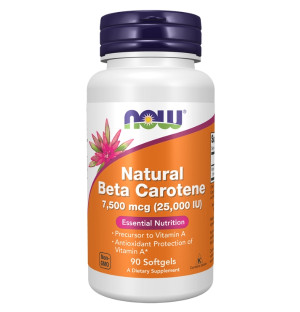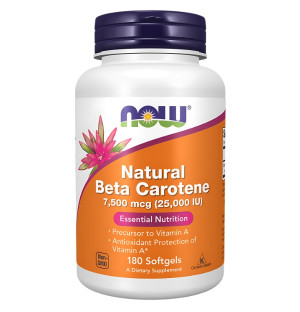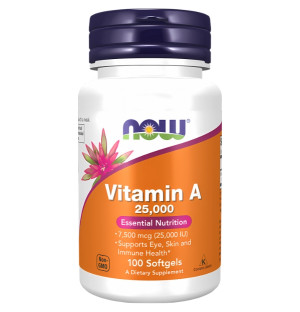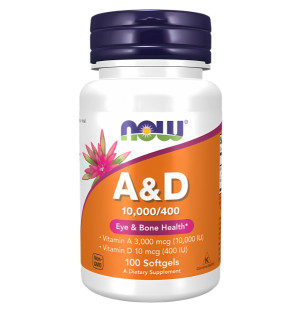Vitamin A
Vitamin A - the key to healthy eyes, skin and immunity
Vitamin A is one of the most important fat-soluble vitamins and plays a fundamental role in maintaining the health and proper functioning of the body. It is essential for normal vision, immune function, skin regeneration and many other physiological processes. Vitamin A comes in two main forms: retinol (of animal origin) and carotenoids, which are provitamins of plant origin (the best known being beta-carotene).
Vitamin A supplements are an excellent option for people who want to take care of their eye health, skin health, as well as support immune function and overall body health.
Role and health benefits of vitamin A
✅ Eye and vision health: Vitamin A is crucial for the proper functioning of the retina. It helps in the production of rhodopsin - a pigment that is essential for vision in low-light conditions. Vitamin A deficiency can lead to vision problems such as night blindness (difficulty seeing in low light). Long-term deficiency can lead to more serious problems, including macular degeneration and cataracts.
✅ Support for healthy skin: Vitamin A supports the production and regeneration of skin cells to help maintain healthy and radiant skin. It acts as a powerful antioxidant that neutralises free radicals, preventing premature skin ageing and reducing the appearance of wrinkles. Retinol, one form of vitamin A, is also commonly used in dermatology to treat acne, psoriasis and other skin problems as it promotes skin regeneration and collagen production.
✅ Immune system support: Vitamin A plays a key role in strengthening the body's natural defence barriers, such as the skin and mucous membranes, which are the first line of defence against infections. In addition, vitamin A supports the production and activity of white blood cells, which helps the body to fight off bacterial, viral and other pathogen infections.
✅ Proper development and growth: Vitamin A is crucial for normal cell development and tissue differentiation, especially during periods of intense growth such as early childhood and pregnancy. It is essential for healthy foetal development, especially for the growth of bones, skin, eyes and other organs.
✅ Reproductive health support: Vitamin A supports the health of the reproductive system in both men and women. In women, it is important for normal pregnancy, including fetal development. In men, vitamin A is needed for the production of healthy sperm.
✅ Protection against oxidative stress: Vitamin A, especially in the form of beta-carotene, acts as a powerful antioxidant that helps neutralise free radicals in the body. It protects cells from oxidative stress, which is key to protecting against chronic diseases, including ageing and cancer.
Forms of vitamin A
-
Retinol and retinol esters (animal origin): Retinol is a form of vitamin A with direct action and high bioavailability. It is mainly found in animal products such as liver, cod liver, milk, butter, eggs and cheese. Vitamin A supplements based on retinol are absorbed faster by the body and can quickly correct deficiencies.
-
Carotenoids (plant origin): Carotenoids, such as beta-carotene, are provitamins that the body converts into active vitamin A when needed. They are present in plants, especially in fruits and vegetables with intense orange, red and yellow colours (e.g. carrots, pumpkin, yams) and in green leafy vegetables (spinach, kale). Beta-carotene, as an antioxidant, also acts independently of vitamin A to protect cells from oxidative stress.
Symptoms of vitamin A deficiency
- Vision problems: Dusk blindness (deterioration of vision at dusk) is one of the first symptoms of vitamin A deficiency. Long-term deficiency can lead to more serious eye conditions such as xerophthalmia (corneal dryness) and permanent damage to vision.
- Skin dryness and irritation: Vitamin A deficiency can lead to excessively dry skin, flakiness and the formation of eczema.
- Reduced immunity: Lack of sufficient vitamin A can weaken immune system function, increasing susceptibility to infections, especially respiratory infections.
- Growth and development problems: In children, vitamin A deficiency can delay growth, and in pregnant women, affect fetal development.
For whom is vitamin A supplementation intended?
❎ People with vitamin A deficiency: Low vitamin A intake or absorption disorders can lead to a deficiency that requires supplementation.
❎ People with vision problems: Vitamin A supplementation can help maintain normal vision, especially in people at risk of age-related eye disease.
❎ People concerned about skin health: Vitamin A promotes skin regeneration and can help treat skin problems such as acne and dry skin.
❎ People with weakened immunity: Vitamin A supports the immune system to protect against infections, especially during periods of increased risk of infection.
❎ Pregnant women: Vitamin A is crucial for the proper development of the foetus, so pregnant women may need adequate supplementation, as recommended by their doctor.
Summary
Vitamin A is essential for eye health, skin health, the immune system and overall body health. It is found in animal and plant-derived forms, providing a wide range of supplementation and supplementation options. Its action as a powerful antioxidant helps to protect cells from oxidative stress, which is key to maintaining health and youthfulness. Vitamin A supplementation can support the health of the eyesight, skin, immune system and the normal development and growth of the body, especially during periods of increased demand.





